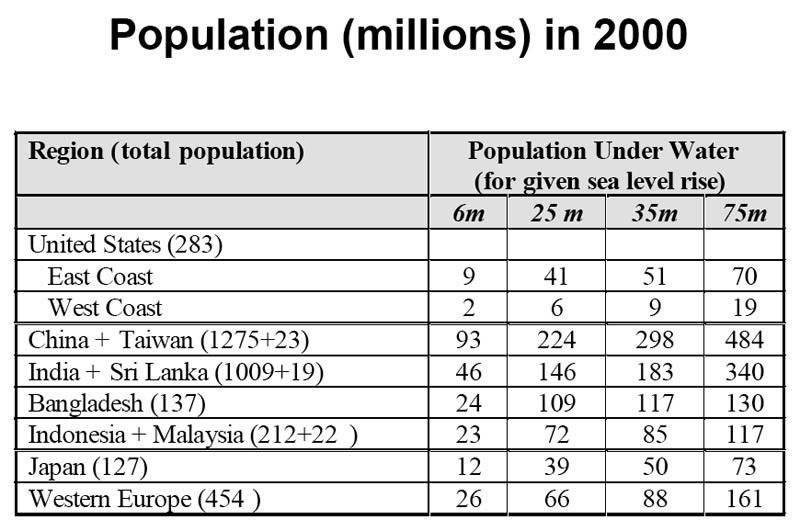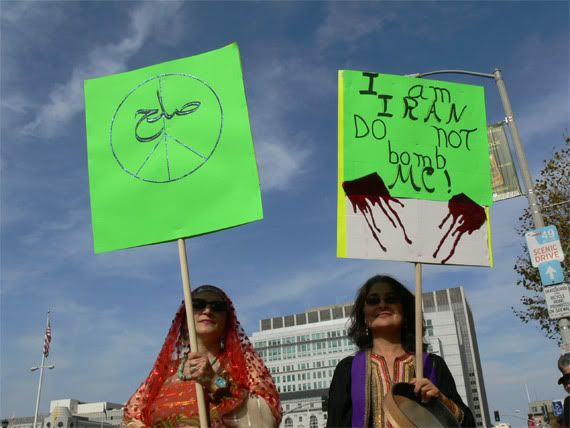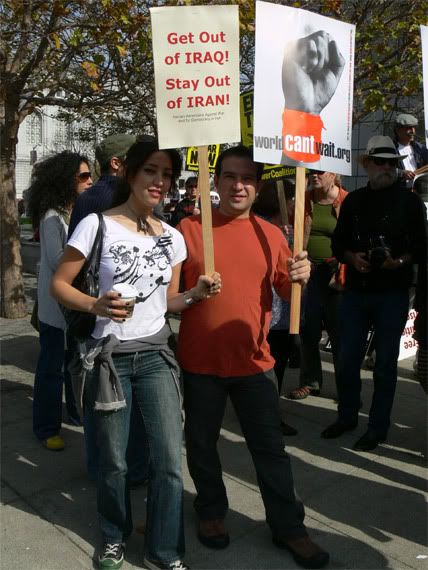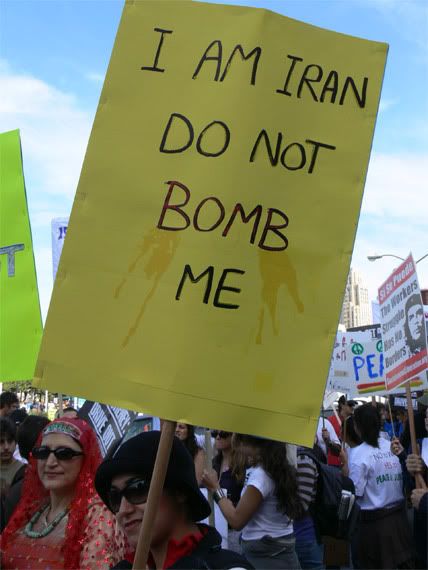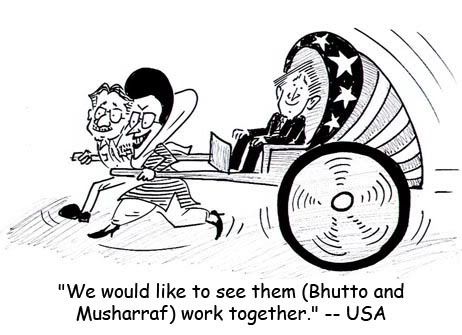The history of the labor wing of the US-led multinational empire -- such as the International Trade Union Confederation (the result of the 2006 merger of the International Confederation of Free Trade Unions and the World Confederation of Labour) with which the International Transport Workers' Federation is allied -- claiming to promote free, independent trade unions, i.e., trade unions that are independent of Communist parties and governments, and to act in solidarity with workers of the global South has not been a pretty one: see, for instance, Beth Sims,
Workers of the World Undermined: American Labor's Role in U.S. Foreign Policy (South End Press, 1992). The end of state socialism and the Cold War did not change its fundamental role. A more recent history of it has been documented by such labor writers as
Harry Kelber and
Kim Scipes among others. Here is an example from Haiti: Jeb Sprague,
"Failed Solidarity: The ICFTU, AFL-CIO, ILO, and ORIT in Haiti" (
Labor Notes, June 2006). Leftists inside and outside Iran ought to be aware of what the labor wing of the empire does.
1The labor wing of the empire, like other vehicles of
"democracy assistance," seizes upon a real problem of most post-revolutionary governments, whether they are Communist, nationalist, or Islamic: the fact that space for autonomy for organizations of workers and others is restricted to various degrees for reasons of national security (lack of autonomy is nearly complete under a one-party state-socialist state). The absence of autonomy eventually undermines the social gains of revolution when either the rulers abandon their commitment to the ideology that made revolution possible or the ruled become depoliticized and self-centered or both (the history of state socialism in
China, Russia, and Eastern Europe is a cautionary tale for the Iranians, just as the history of the overthrows of
Mossadegh,
Arbenz,
Allende, and others is). However, workers who turn to the labor wing of the empire to solve this undeniable problem usually come to grief.
Workers of the North, especially in the USA, are normally unaware of the dilemma faced by workers under post-revolutionary government in the South, who must fight for their class interests without undermining their national interests (especially defending their nation from the empire). In many cases, trade union members in the USA aren't even aware of what their unions are doing at home, let alone abroad. Naturally, they do not realize that intensified global competition, workers of formerly socialist or nationalist countries now competing with them for jobs, has come about in part because of the exertion of top labor bureaucrats of the North who were supposed to protect their interests.
In the meantime, workers of the North are also finding out how good their free, independent unions are, some of which are going far beyond business as usual of concession bargaining and giving up the right to strike altogether. See, for instance, Sam Gindin,
"The CAW and Magna: Disorganizing the Working Class" (
MRZine, 22 October 2007).
It is possible that, in the near future in the North, only French workers will remember how to strike, if not to win new gains, at least to defend their way of life. Even the still impressive national solidarity of French workers, however, may eventually be undermined by the gap between the public and private sectors: "nearly 20 points separates the rate of sympathy [for the 18 October 2007 strike] in the public sector (69%) from that in the private sector (49%)" (Christelle Chabaud,
"The Majority Strike in Public Opinion," MRZine, 18 October 2007).
1 For instance, "On 15 February 2006, the ICFTU and its International Transport Workers' Federation coordinated rallies and protests outside Iranian legations world-wide" (Andreas Malm and Shora Esmailian,
Iran on the Brink: Rising Workers and Threats of War, Pluto Press, 2007, p. 120), officials of the AFL-CIO and James P. Hoffa of the US Teamsters Union taking the lead. Malm and Esmailian celebrate this as "an unequalled manifestation of global solidarity with a labour movement in the Middle East" and "the most awe-inspiring show of global opposition to the labour politics of the Islamic Republic ever recorded" (Malm and Esmailian, pp. 120-121). Note, however, that nothing of the sort was done for any other Iranian workers, let alone workers of other countries in the Middle East, especially those of the empire's client states like
Egypt.
Other Iranian labor activists took note of this contrast. Malm and Esmailian report that "The activists of Mohsen Hakimi and the other council communists of Komiteye Hamahangi, on the other hand, limited themselves to issuing a few statements, one of which was a condemnation of the global day of action" mentioned above (Malm and Esmailian, p. 121). The condemnation in question stated: "It means that the ICFTU . . . in the realm of the current conflict among the bourgeois government of Iran and other bourgeois governments [sic] has wanted the false defense of the demands of workers in Iran [to] be made a pretext in order to support one sector of the bourgeoisie in contrary to another sector" (qtd. in Malm and Esmailian, p. 121). While the translation is awkward, you get the drift. Malm and Esmailian cite it only to dismiss it as "[u]ltra-leftist gibberish," but that says more about their own lack of understanding of the labor wing of the empire, of which some Iranian workers are aware.
So do some workers of the North. Take
Zenroren, an ally of the Japanese Communist Party, for instance. This year, there was an "ITF/ITUC International Action Day on Thursday 9 August in solidarity with union leaders Mansour Osanloo and Mahmoud Salehi," the day of action in part organized by the State Department-funded Solidarity Center.
Rengo joined them, but Zenroren did not. Communists of Japan, no longer Marxists, still know better than getting involved in labor imperialism.
Far from it, JCP leaders actually attend the celebrations of the Iranian Revolution held at the Iranian Embassy in Japan and take other actions for the purpose of what they call Yato Gaikou, "opposition party diplomacy": see, for instance,
"イラン革命記念レセプションに 志位委員長が出席," Akahata, 11 February 2003;
"イラン革命記念レセプション: 不破議長が出席," Akahata, 11 February 2004;
"イラン革命記念レセプション: 志位委員長が出席、ハラジ外相とあいさつ," Akahata, 11 February 2005;
"イラン大使と志位委員長が懇談," Akahata, 21 December 2005; and
"イラン革命記念レセプション: 市田書記局長が出席",
Akahata, 10 February 2007.
Not that they agree on everything. The JCP, like most political parties in the world, is committed to a two-state idea on Israel/Palestine, whereas Iran is just about the only country in the world whose government is officially committed to a one-state solution based on the referendum of all people who live in historic Palestine and Palestinian refugees (though Iran's government adds that, whatever the Palestinians accept, it will also accept it), and the party candidly discusses its concerns with Iran's ambassadors (see
"イラン大使と志位委員長が懇談," Akahata, 21 December 2005).

